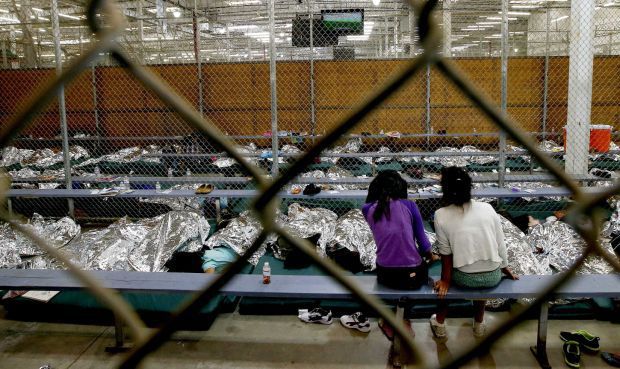PHOENIX — Immigrant-rights groups are asking a federal judge to force the Border Patrol to end the “inhumane and punitive conditions” they say many detainees face at Arizona facilities.
The legal papers filed in U.S. District Court name three individuals — a man living in Tucson and two unidentified women — who attorneys say were denied food, adequate clothing and sleep.
Mary Kenney, an attorney with the American Immigration Council, said Wednesday that what the trio experienced is not unique.
A majority of the more than 72,000 people detained in the Border Patrol’s Tucson Sector in a six-month period in 2013 — a “representative sample” the lawyers sought through public records requests — endured the same conditions, Kenney said. And while the agency’s own guidelines say holding cells should be used for no more than 12 hours, about 80 percent were held for at least twice that long, a third held for 48 hours and almost 8,000 locked up for three days or more, all in horrible conditions.
“They have been packed into overcrowded and filthy holding cells with the lights glaring day and night; stripped of outer layers of clothing and forced to suffer in brutally cold temperatures; deprived of beds, bedding and sleep; denied adequate food, water, medicine and medical care,” the lawsuit states. It also claims a lack of “basic sanitation and hygiene items” like soap, toilet paper and sanitary napkins.
And those conditions, the attorneys say, exist in all of the short-term detention facilities that the Border Patrol operates in the Tucson Sector.
“Even those things that are easy to be fixed have not happened yet,” said Nora Preciado of the National Immigration Law Center. That, she said, leaves legal action as the only remedy.
Attorney James Lyall of the American Civil Liberties Union said the conditions are so bad that, unlike some other lawsuits against the agency, challengers have decided not to seek financial relief.
In a prepared statement, Customs and Border Protection, the parent of the Border Patrol, said it “takes the safety and welfare of individuals in its custody seriously.”
The agency did not respond to any of the specific allegations, saying that agents “make every effort to ensure that those in our custody are given food, water and medical attention as needed” with facilities “maintained in accordance with applicable laws and policies.” The statement also says the agency investigates all allegations of misconduct.
But the statement also acknowledges that the holding cells “are designed to be short term in nature and to house individuals until they can be processed, turned over to another agency or repatriated.”
Lyall said that’s part of the problem.
The Border Patrol, unlike Immigration and Customs Enforcement, does not have facilities designed to hold people for any length of time, Lyall said. Yet detainees are likely to be confined there at least 24 hours, if not longer.
The lawsuit says none of those detained had access to a bed while confined.
“The vast majority of former detainees — including women detained with children — were forced to spend the night on a cold cement floor or a hard bench with no mattress and no bedding,” the lawsuit states.
But there’s more.
Those detained lose all but one layer of clothing before being packed into holding cells with “extremely cold temperatures.”
“From the moment these people are apprehended they are treated in a way that can only be described as subhuman,” Preciado said.
Colette Mayer, an attorney in private practice helping with the lawsuit, said the large number of people crossing the border illegally and being apprehended is legally irrelevant.
“The Supreme Court has repeatedly held that everyone in the country is entitled to some basic constitutional rights,” she said. “These people are being deprived of basic due process rights.”
And Preciado said the evidence gathered suggests the poor conditions go beyond the agency’s inability to keep up with the flow of migrants.
Mayer said the lawsuit seeks to force the Border Patrol to have “at a minimum a compliance with its own policies.” That includes not only limits on how long people can be kept in temporary holding cells but guarantees of access to food and medical supplies.
“We would say that those policies are still unconstitutional,” she said. Still, Mayer said, it’s a starting point. “It’s a pretty quick fix to give people soap,” she said.
The attorneys said this lawsuit focuses on the Tucson Sector because that is where they had done all their research and gotten all the public records. But they also said the conditions there likely occur throughout the Border Patrol system.
Conversely, they said if a judge orders the Border Patrol to meet certain conditions in the Tucson Sector, that should provide the impetus for similar improvements elsewhere.
The Tucsonan named in the lawsuit is Norlan Flores, identified by the attorneys as a 34-year-old Nicaraguan native who has lived in the city about nine years.
He had applied for a visa as the victim of a crime who had cooperated with authorities, a petition that recently was approved, allowing him to live and work in the United States.
But last year, while returning to a hospital after the birth of his daughter, the lawsuit says he was arrested by Tucson police for a minor traffic violation.
Border Patrol agents arrived and took him to the Tucson station, where he was held about 36 hours in four different holding cells.
“None of the cells had beds or bedding,” the legal papers say. And for part of the time he was held with about 130 other men in a cell posted for occupancy of about half that many, with no soap, towels or showers.
And while the visa was approved, he has not yet obtained it, meaning he could be detained again.





